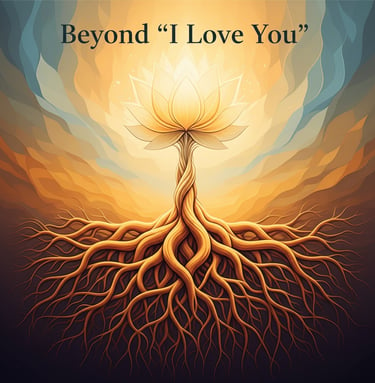Beyond "I Love You": Why Love Isn't the Foundation, But a Beautiful Outcome
Love isn't the foundation of a strong relationship; it's the beautiful outcome of safety, respect, and shared growth.
When people talk about relationships, especially romantic ones, the phrase “I love you” is often placed at the center—as if love alone is the glue that holds everything together. But in my work as a mental health counsellor, I've seen time and again that love, while important, is not the foundation of a healthy, sustainable relationship. It is the outcome—a result of consistent care, mutual respect, emotional safety, and shared growth.


The Myth of Love as a Foundation
Popular culture romanticizes the idea that love conquers all. But love without structure is like a house without a solid base. Passion may be intense, words may be affectionate, but without compatibility, communication, safety, and shared values, love struggles to survive the realities of daily life.
Couples often walk into therapy saying, “But we love each other, why isn’t this working?” That question in itself reveals the core misconception—that love should be enough. What they often overlook is the need for foundational elements that make love sustainable.
So What Actually Forms the Foundation?
Safety and Security: Emotional safety—knowing that your vulnerability won’t be used against you—is vital. It allows partners to show up as their true selves without fear of judgment or punishment.
Mutual Respect: Love without respect can easily become controlling or dismissive. Respect means valuing each other’s boundaries, choices, individuality, and personhood.
Accountability and Trust: These are not just checkboxes; they’re active commitments. Trust grows when actions align with words. Accountability means owning mistakes and working through ruptures, not brushing them under the carpet.
Compatibility in Values and Lifestyles: You don’t have to be the same, but alignment in core values—like how you view commitment, gender roles, conflict, family—affects long-term success more than emotional intensity.
Emotional Maturity and Communication: The ability to talk through hard things, to tolerate discomfort, and to co-regulate during emotional storms is what truly deepens connection.
Shared Effort and Growth: Love thrives when both people water it. One-sided effort, no matter how intense the feelings, eventually creates burnout or resentment.
Love as an Outcome
When a relationship is grounded in safety, effort, honesty, and emotional intimacy, love becomes the natural result. Not the fleeting, dopamine-driven high of early romance—but the kind that feels secure, enduring, and liberating. A love where “I love you” isn't just a declaration, but a reflection of the way you show up for each other every day.
It’s the kind of love that grows slowly, sometimes quietly, but deeply. It doesn’t ask to be proven—it’s evident in the way partners navigate conflict, celebrate each other’s wins, and support each other through change.
Re-framing Relationship Goals
Instead of asking, “Do we love each other?” perhaps a better question is:
Do we feel safe with each other?
Are we committed to understanding each other?
Can we grow as individuals and as partners within this relationship?
Do we respect and cherish the other person’s humanness, not just our image of them?
When those questions are met with “yes,” love doesn’t just appear—it flourishes.